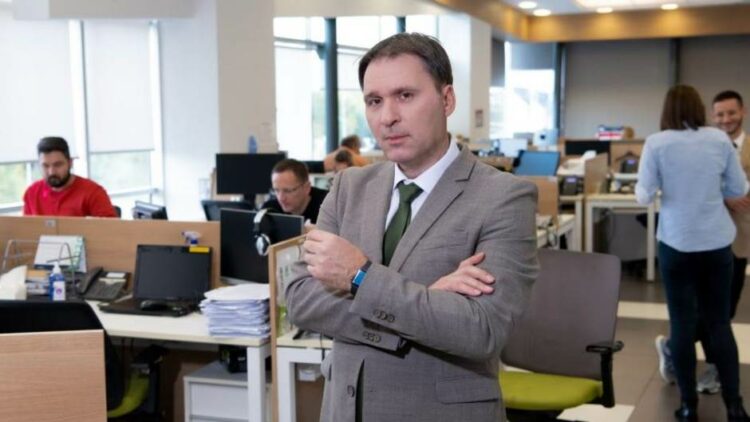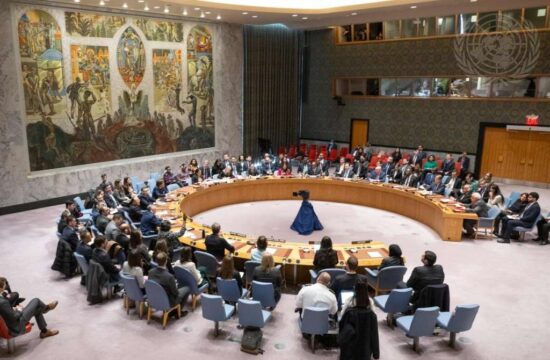
Our greatest success is that the viewers of national TV stations turn to us in crisis situations and show that they trust us the most because they know that we do not hide anything, that there is no need to read between the lines with us, N1 Serbia executive producer, Igor Bozic, told Nova.rs in light of the sixth anniversary of the beginning of the broadcasting of this TV channel.
Tense, challenging, under pressure, but very passionate and very satisfied with what we have managed to achieve in these six years – this is how Bozic described in one sentence the path that this media outlet has gone so far. In an interview for Nova.rs, he explained what problems he encounters in his work, why the government wants to make this editorial office its political opponent, as well as why the part of the public that is critical of the government does not understand the role of the media in society.
What was the key achievement of N1 in the past period?
The essence of what we have accomplished is that people trust us and show this in all crisis situations because they know that we will not hide information. That is our motto. We started with the principle that there are no forbidden topics for us and that proved to be the right way to gain an audience very quickly.
We have exact data showing that when the coronavirus crisis started, a large number of people who watch the media with a national frequency started to get informed on our channel. What is very interesting is that, although every time when there are some elections in Serbia we had excellent results, this time, at the beginning of the coronavirus crisis, the difference was dramatically bigger. We were twice as watched as the next media outlet behind us on that list of TV channels.
This can be seen best when it comes to the so-called breaking news, the key and groundbreaking news, then everyone trusts us. During the demonstrations this summer, and since we were the only TV channel that reported on it, the percentage of viewers was 50 percent. This means that half of the people who were watching television via digital cable receivers at the time were watching our programme.
What kinds of problems and challenges did you face in the beginning and what problems do you face now?
We had problems and encountered resistance from the beginning. I think it's because of the biographies of the people who came to work in the beginning, because they were people who came from independent media. The character of this government in Serbia is that it immediately perceives us as if we were enemies and they started to label us. First, they marked us as “yellow” journalists, then as Americans who will, according to their interpretations, work for the American interest and against Serbia. I can't say that it was ridiculous for us in the beginning, because then it looked quite scary to us. However, this has multiplied so much over the years. If you look at what they are now writing about N1 at all levels, not only in one tabloid but in all of them, while knowing that they are all close to the government, then it is clear that this is not a coincidence.
It is clear that this voice of objectivity that we want to present, our way of providing a true picture of what is really happening in Serbia, to show both sides of the coin, bothers the part of the public represented by these tabloids which behave as the government dictates.
What do the pressures you are exposed to look like?
We don’t get such calls, but I believe and know that they literally call our colleagues who work for the public service or other private televisions and dictate to them what they should do, what questions they should ask. We do not have these problems. However, we have the problem of the pressure that is created regarding us, from the environment in the tabloids which constantly target us, label us, tell lies and half-truths about us, target individual journalists by digging up some photos from their youth.
Anyone who tries to be professional in any way becomes the target of an attack. I almost don't know of a journalist who wasn’t targeted by those tabloids and that part of the public on social networks.
What does working in such conditions look like?
The public in Serbia is deeply divided and poisoned by the influence of ‘bots’ on both sides on social networks, and in tabloids which are being instructed by political centres of power. That is our main problem. In such a situation, we feel as if we are standing alone, along with several independent portals and weeklies, and as if we are, practically, on the forefront. The key problem is that, throughout the last two years, they have been trying to prevent us from doing our job and to present it as being something else, to label us. It's as if we are, for example, supporters of (Dragan) Djilas, even though he has nothing to do with our media. On the contrary, when he comes to visit, he gets very annoyed when we ask him some questions because that is what politicians are like.
How do you fight against this?
We do our job the best we can and we get to a situation where we have to explain to people that what we are doing is the normal job of a journalist. The saddest thing about it is that we are left there alone on this forefront, that there is no one to protect us and that there are fewer and fewer media that can withstand those pressures.
The government, and even the part of the public that shares the views of the ruling coalition, perceive N1 as an opposition television.
Yes, they are trying to present us as political opponents, as a political factor. You will often hear Aleksandar Vucic say in his address to our journalists “I know that you do not support me” or ironically saying “I know that you support me”. He is trying to turn us into his political opponent.
The media should not support anyone but should report on what is happening. They are trying to push us in that direction so they can, in this way, justify why we report as we do. I believe that, unfortunately, with part of the electorate and the audience that watches this all happening on national television for days and months, that such a crazy theory may even sound true in the minds of some when it is repeated a thousand times.
However, the other part of the public, which is against the government, expects you to support the opposition, to fight their battles.
That is also pressure, that view of reality and journalism. I don’t doubt that it would mean a lot to opposition politicians if someone was on their side, but such a view of our work also represents pressure to us.
Somehow it seems to be implied that other media do the nonsense they do while we get strongly criticised even when we make a small mistake in the signature in the news within 12 hours of our daily program, which is a logical and extremely normal mistake. We are immediately criticised for that.
Even the public opinion, which is not on the side of the government, immediately expresses the worst kinds of criticism to us if what we do does not fit into what they think our job should be. This is also something you have to deal with.
Both sides attack us, each for their own reasons, each for his own interests, and you have to resist them both. I am glad that all our journalists persevere in this, it is not easy for them when someone criticizes them on social networks for some minor things. It is not easy to withstand this attack of that other part of Serbia, which the former one accuses us of working for.
Your editorial office, as well as individual journalists, received threats and there were also attacks. How many of these cases have been processed by courts and how satisfied are you with the reaction of the authorities?
There were threats, attacks, but fortunately, there were no serious consequences and I hope that it will remain that way. We are being targeted by right-wingers, these are pressures that upset journalists, because they don't know what could be waiting for them on the street. Thus, our colleague Dusan Mladjenovic, as he is walking down the street with his three-year-old child, experienced an attack and harassment from a man who would later be sentenced to medical treatment because of these attacks.
Due to the campaign that is being led against us, you get into a situation where someone can take up ‘their own’ justice in their own hands and physically attack our journalist on the street because they believe everything they heard about us in media that is close to the government. The government cannot control that. They may be able to control organized groups, but what they produce with the noise they create around N1 is very dangerous. They can produce a situation where people who are mentally unstable take matters into their own hands to physically punish someone. That is what no one in the government thinks about when they launch such campaigns and produce lies against us.
The Prosecutor's Office for High-Tech Crime has reacted in several cases of threats. They didn't solve all of them, but they did their best in some cases. We also had two convictions. The police found a man who threatened to set us on fire and he was sentenced to psychiatric treatment. I can't say that they didn't react, but they did not always.
What else could authorities have done but did not do?
The obvious thing is that they never did anything regarding the people who threw leaflets calling us Albanian mercenaries or a Luxembourg TV channel, they didn't bother to find them at all. There are people who make organized groups on Facebook for running a campaign against us and those groups pay for their posts. So, someone is investing money to denounce us and to threaten us. These people were never found. I can't say his name, but I can suspect who the man behind it is. However, the prosecution did nothing in those cases. And then we hear the president's adviser say that it was done by right-wing groups. Why didn't they, if they knew who did it, ensure that those right-wing groups face the law?
To sum it up, is the situation in the media better or worse now than it was six years ago? What is it like compared to some previous periods?
When I look back six years, the fact is that this government, as time goes by, enters deeper and deeper into all pores of life at levels of not only of local communities but also into private companies and I think that the pressure is far greater. It is also clear when we hear that people who are employed in the public sector and use the cable operator SBB receive a message from their party-aligned bosses that they must get rid of SBB and switch to MTS in order to keep their jobs. We never had that until now, even during the time of Milosevic. It represents the perfidious conditioning of one’s job with what they want to watch. And while doing that, they claim that they are doing it in the interest of a state-owned company, but in fact, their only goal is to reduce the influence of someone who can speak openly about everything.




